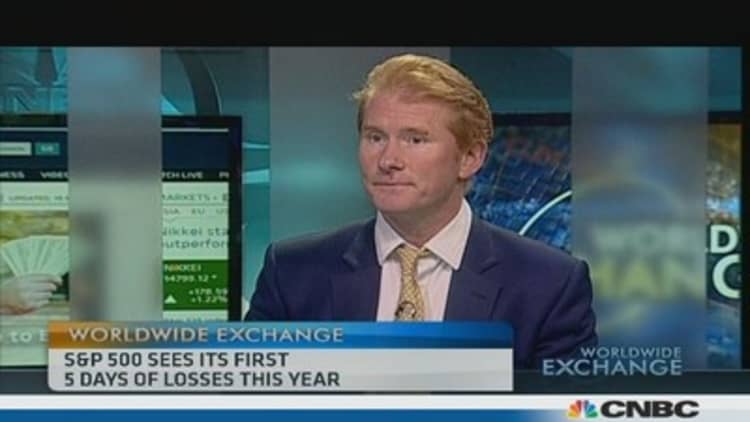U.S. shares are headed for a big drop in the first quarter of 2014, followed by a year-long period of stagnation, Societe Generale predicts.
"After gaining 170 percent since March 2009, we believe that U.S. equities are a tired and crowded asset," the investment bank said in a note.
"Corporate profitability is close to peak levels, while at the same time the number of companies disappointing on the earnings front is increasing. Also, a stronger U.S. dollar and higher (10-year Treasury) bond yield would not help a market that is no longer cheap," it said.
(Read more: Fund managers love euro zone equities: Survey)
The bank added that the U.S. government shutdown amid a budget impasse highlights the country's dysfunctional policy and increases uncertainty.

With the Federal Reserve still continuing to inject liquidity via its $85-billion-a-month asset purchase program, U.S. stocks are unlikely to fall much before year-end, it said. The house expects the S&P 500 index to end the year around 1600; the index ended Monday at 1676.12, down 0.85 percent.
But the bank expects the drop to accelerate at the beginning of 2014 as the market prices in the end of the Federal Reserves' asset purchases, estimating the S&P 500 will fall to 1450, likely in the first quarter, down around 15 percent from its peak, although it predicts a recovery back to 1600 by year-end.
It notes the S&P 500 fell around 16 percent after the Fed's first round of quantitative easingended, and by another 17 percent after the end of the second round.
"In the two to three years that follow, the U.S. equity index should remain relatively flat, burdened by higher yields (rate hikes in mid-2015), a higher U.S. dollar and limited earnings growth (return on equity is already high), but supported by better economic prospects and a new shareholder value cycle, staving off a bear market," it said.
(Read more: Why the shutdown could mean no tapering this year)
"We advise investors to switch into euro zone and Japanese equities, where economic policy is much clearer, monetary policy very loose and positioning is low.
Other banks are also turning more cautious on U.S. shares.
HSBC cut the U.S. market to Neutral from Overweight, although it expects the S&P 500 at 1750 at end-2013 and 1900 at end-2014.
"The growth outlook remains decent, but we see the potential for greater positive surprises elsewhere and valuations look stretched relative to the rest of the world," HSBC said in a note.
HSBC didn't move to an Underweight view as it expects the perceived safe-haven status of the U.S. market to help sustain its premium.
Europe also made HSBC's recommended list, with the bank upgrading it to Overweight from Neutral in its portfolio.
(Read more: Bill Gross: Fed will have to taper at some point)
"The region is attractively placed from both a growth and monetary policy perspective," it said, citing the euro zone's return to economic growth in the second quarter and its scope to ease monetary policy. Equity valuations there are also undemanding at 12.7 times 12-month forward earnings, compared with the long-term average of 14.7 times.
But unlike SocGen, HSBC is negative on Japan, downgrading it to Underweight. "The bulls are fully invested and the skeptics have closed their underweights," it said, indicating shares are unlikely to rally much further unless signs of change in corporate Japan emerge. HSBC also expects Japan's economy to slow ahead and views equity valuations as no longer particularly attractive.
—By CNBC.Com's Leslie Shaffer; Follow her on Twitter @LeslieShaffer1



